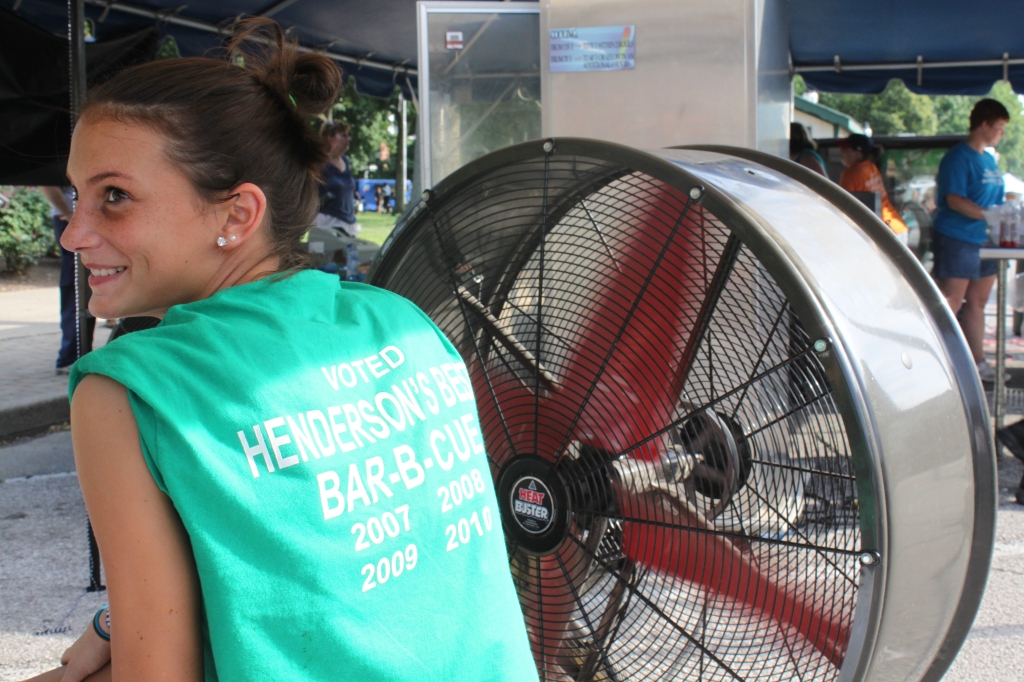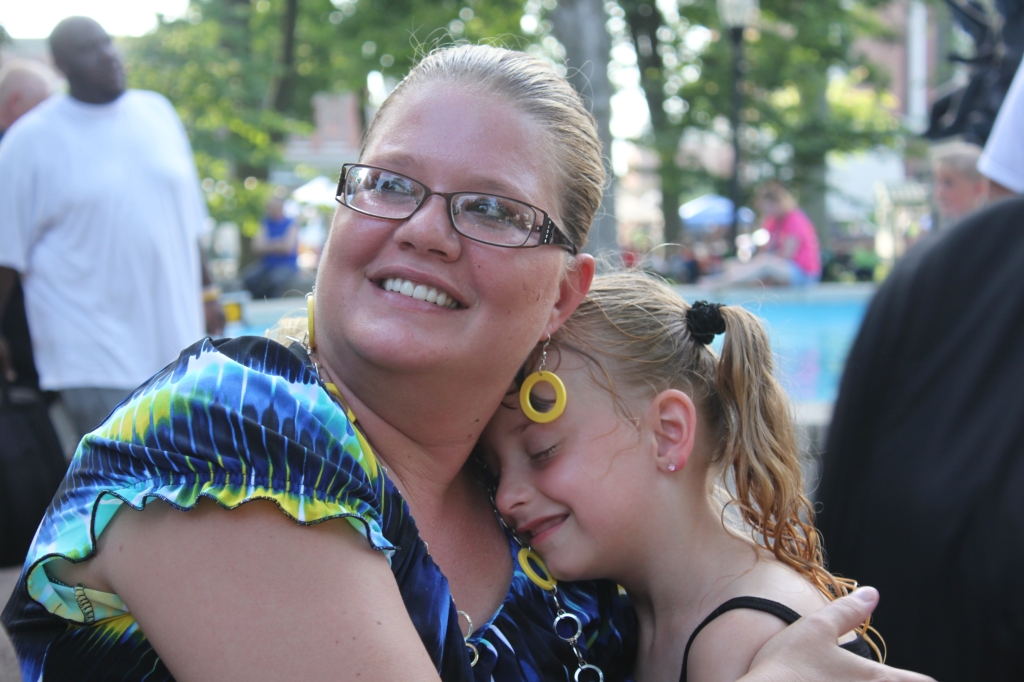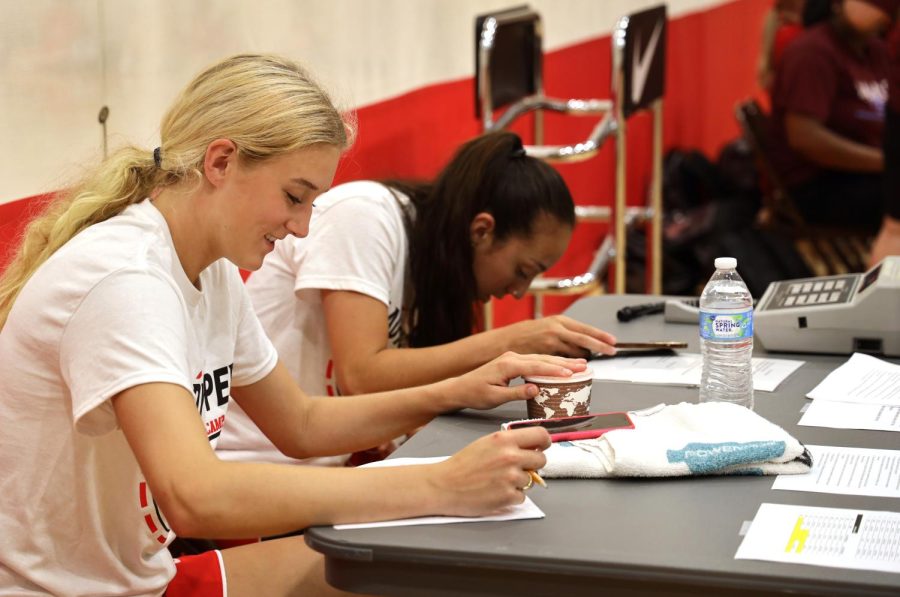Growth and Construction Article
By Kelsey Randhawa
Western Kentucky University President Gary Ransdell has big plans for the school’s future and it’s resulted in a major construction boom on the Bowling Green campus.
In five years he hopes to have created the second largest university in Kentucky with 25,000 students and a world-class honors college.
Through a number of multi-million-dollar construction projects that include the renovation of old buildings and creation of new ones, Ransdell and his staff are working to make his dream a reality.
Ransdell launched a campus renovation campaign in 1998 and several buildings have been completed or dedicated since January.
Most recently, Van Meter Hall, Snell Hall, College High Hall, Paul Orberson Baseball Clubhouse, the Chandler Memorial Chapel and an addition to the Preston Health and Activities Center were finished or dedicated.
Before Ransdell retires in 2022, he plans to have every academic building renovated or replaced as well as the residence halls and student life facilities.
It’s part of his plan to make Western “a leading university with international reach” and to create a pleasant environment for students to learn.
A nice atmosphere “creates inspiration,” which is fundamental to success, Ransdell said.
“I want people to come to campus like it’s a park and enjoy it. The students have the best classrooms and labs, but I also want them to be in a place that inspires them.”
The renovations are just one way Ransdell hopes to elevate the university to a new level. He also plans to raise admission standards, double international enrollment and get 20 percent of undergraduates studying abroad in the next five years.
“We’re different than other universities,” he said. “We are controlling our own destiny as a university and focusing on determining what we are capable of achieving and achieving it.”
Ransdell also wants to make Western a research powerhouse, so much of the campus that houses the Ogden College of Science and Engineering has been renovated. Snell Hall, which houses research labs and classrooms on that campus, was dedicated in February.
On the opposite end of campus, construction of a new College of Education building began in fall 2006. That structure will be completed this winter.
Western also hopes to construct an Honors College building within the next five to six years, Ransdell said.
John Osborne, vice president of campus services and facilities, said the renovation of the science campus, replacement of the Gordon Ford College of Business and the renovation of the Downing University Center are three high-priority future projects.
One of the detracting features of campus that Ransdell hopes to remedy with the construction is the lack of architectural cohesiveness.
“I don’t know what they were smoking in the ‘60s, but the architects ran amok,” Ransdell said.
To address this concern, Ransdell said that the new buildings are built to be aesthetically pleasing, with the classic Georgian brick-and-stone style, and to be consistent on the outside while having a state-of-the art interior.
“It’s beautiful and modern, especially the architecture,” said Joshua Nichol-Caddy, a 25-year-old graduate from the University of Missouri who was visiting WKU for the Dow Jones News Fund online workshop.
To improve the campus even more, several construction projects are taking place during the summer.
Bryan Russell, the director of the Planning, Design, & Construction Department, said the primary focus of construction over the summer is on smaller projects as opposed to the larger projects, which occur year-round as funding becomes available.
The replacement of the roof of the Downing University Center, more commonly known as DUC, is one such project that has cost $850,000.
And the rest of the changes haven’t been cheap either. To date, about $500 million has been spent in a dozen years on construction and tuition has tripled.
In such a challenging economic climate, Ransdell’s choices have been met with some criticism.
Dirichi Njoku, a 21-year-old junior, said most of the construction is good because it is necessary, but some of the construction that is solely geared toward making the campus look better should not be done.
Ransdell is not overly concerned with critics, though.
“I’m convinced that students are good consumers; they’ll recognize quality and buy it,” he said.
Nineteen-year-old sophomore Melissa Hurd agreed with him. She said that even though the renovation requires money, it makes the school more attractive, up-to-date and technologically advanced, so the benefits outweigh the costs.
Jacob Glover, a 22-year-old in a master’s program at WKU, also thinks that the construction is positive and has made Western the best campus in Kentucky.
“It gives students a sense of pride,” Glover said.
Ransdell noted that all of the monetary onus hasn’t been placed on the students. State allocations are used to construct many of the buildings, and many of the others are funded with auxiliary resources, such as private businesses or donors.
He views each construction project as an investment geared toward making the campus more unique and pleasant and strives to find “the right balance of price and quality.”
“We want to nurture what makes us distinct as we change for the better,” Ransdell said.
One of the unique features of the campus that is continuously evolving is the art on campus. Statues have been added around the campus to beautify it.
Also, Randsell has removed many thoroughfare streets and pushed parking lots to the periphery. As a result, the campus is more enclosed, which some students appreciate.
“You can walk anywhere, you meet people because everything is near, and it has a family atmosphere,” said Hurd, adding she loved the beauty and cleanliness of the campus.
Nichol-Caddy said he was quite impressed by the appearance of the campus.
“I didn’t have a whole lot of expectations because it’s not the flagship campus (like the University of Kentucky),” he said. But the campus was actually “beautiful and modern.”
The graduate student said he especially liked the “beautiful views” from the top of the hill and the green space.
“I like how they maximize their geographical gifts,” Nichol-Caddy said.
By Adam Pennavaria
W.C. Handy Blues & Barbecue Festival
Glasgow High School
For a week in June, Audubon Mill Park in Henderson is filled with the smell of barbeque, the sound of blues, and the sight of countless beads of sweat glistening on the foreheads of attendees; the W.C. Handy Blues & Barbecue Festival has begun.
The concept of the festival originated in Memphis, based simply on the cooking of barbeque, festival promotions chairwoman Christi Dixon recalled. The meat was cooked and judged, but not sold to the public. This changed when the cooking contest migrated out of Memphis and into Henderson, blending perfectly with the local music scene, which was primarily blues.
“The music finds us,” music chairman Dorin Luck said.
Through the use of websites like Youtube and his connections to booking agents from around the country, Luck receives emails and phone calls from prospective festival participants. Once Luck has developed a sizeable list of musical act, the concert board meets to decide which bands will be invited to play. The decision is based on the quality of live material that the bands produce.
“There’s a lot of good stuff out there,” Luck explained.
Activities associated with the festival began on Thursday, June 10, with a children’s arts camp and umbrella workshop. Friday featured the W.C. Handy Open Tennis Tournament.
The celebration began officially on Saturday with four musical acts – Bob Minnette & the Dixieland Society, Blues 4 U, Velveeta Jones, and Albert Castiglia – performing on stage.
The first day is also known as the “Taste of Henderson Barbeque,” during which vendors sell a variety of food along the streets beside the park. The scent of grilled meat and refreshing beverages filled the air, married with the tunes of blues twisting through the trees. Another incentive for visitors is that the festival is free, with all funding coming from individuals in the community and family-owned businesses from in and around Henderson.
Board members of the Henderson Music Preservation Society Inc. manage the logistics of the festival. The members include Dixon, who has taken on a variety of positions and has taken part in the Blues Fest for 18 of its 20 years; Bruce Farmer, who has been chairman of the Taste of Henderson for 20 years; and Luck, who has been music chairman for 19 years. The majority of board members have been a part of the organization for the majority of the festival’s history.
The festival features an array of events each day. For instance, the first night is the official barbeque night; Thursday night is Zydeco night, which features such acts as Doug MacLeod, Curley Taylor and Zydeco Trouble and Chubby Carrier & The Bayou Swamp Band.
Friday night features special “street food” from the Henderson area; and Saturday is the grand finale: the Java Blues Jam, featuring MacLeod, Kilborn Alley Blues Band, Otis Taylor, Magic Slim and the Teardrops, Shemekia Copeland, and Joe Louis Walker.
Primarily a family-friendly event, the W.C. Handy Blues & Barbecue Festival is an ode to the blues legend who once called Henderson his home. It gives locals and visitors from all over a chance to sit back in lawn chairs and take in music from more than 20 bands.
After all, the blues can be happy, too.
W.C. Handy Sidebar
Born in 1873, in Florence, Ala., William Christopher Handy took coronet lessons in a local barber shop at a young age. When he was about 20, Handy began traveling the country, trying to make a living playing music. His jobs included everything from teaching music at A&M College in Huntsville, Ala., to playing onstage with Mahara’s Minstrels. During Handy’s time with the Minstrels, he acquired a plethora of musical knowledge and earned the nickname “Fess,” commonly short for “professor.”
In 1892, Handy and the quartet he formed for the Chicago World’s Fair got stranded in St. Louis, for lack of funds. When he couldn’t find a job, Handy left for Evansville, Ind. It was near Evansville, across the Ohio River in Henderson, that Handy met his wife, Elizabeth Price, at a barbeque cookout.
Before long, Handy and Price were married, and living happily in Henderson. Ten years passed before Handy decided that it was time to move on and continue his musical career. It was after his time in Henderson that Handy became known for composing blues and spiritual music. And although he did not write any songs while he lived in Henderson, Handy credited his time in the Kentucky town with providing plenty of inspiration for his music.
To this day, he is still celebrated and known as “Father of the Blues,” a title that has lasted through the ages, earning him a place in the South’s richly textured music history.
— Information from bluesnet.org and handyblues.org
Jobs for College Graduates Becoming Scarce
By Franey Miller
duPont Manual High School
Amber Peoples of Morganfield, Ky is “petrified” about graduating college and trying to find good work.
“One of my friends didn’t get a job after graduating for 2 years. I really don’t want that to happen to me. I have no plan for unemployment if I don’t get a job. If worse comes to worse I’ll try to get a job on campus. But I would really like to work in the PR field and maybe move to Chicago.
As the economy continues to crash, more jobs are being lost and people graduating from college are worrying that they too will be unemployed.
According to the Bureau of Labor Statistics, the unemployment rate for the United States in 1999 was 4.2 percent. Just a decade later in 2009, the rate has raised to 9.3 percent. These statistics show that the unemployment rate has risen drastically.
Peoples is a 23-year-old Western Kentucky student majoring in Public Relations. Her dream was to “get a degree and become successful”. She didn’t know what she really wanted to do with her life until last year, she “really put her foot in the door” with finding PR.
“When I found out what I really wanted to do with my life, I started putting my portfolio together and trying to find internships. I quit one internship because the people I interned for didn’t let me do anything.”
Four out of ten journalism and mass communications graduates have been unable to find full time jobs, according to a new survey from the University of Georgia, according to the Project for Excellence in Journalism. In 2008, based on responses from about 2,500 college graduates, only 60.4 percent of the bachelor degree recipients had found full-time employment in the journalism field about a half a year after graduation. In 2007, 70.2 percent had jobs.
“When I graduated in December I was a little nervous,” said Chris Garner, who works for WBKO news station in Bowling Green, Ky.
“But I had connections so luckily I got a journalism job very quickly. It helps to get your name out there and have internships too.”
David Hosey said getting a job in the journalism and broadcast field was definitely easier 10 years ago. As another employee of WBKO, Hosey remembers when he started that his station had three or four more employees working.
“People started moving out of our stations to get better-broadcast jobs. Our director moved away from WBKO to Atlanta,” he said.
Bob Adams, director of student publications at Western Kentucky University said another way to reassure yourself that you will get a job sooner is getting internships and prior work. Adams worked two internships in the summer at the newspaper in his hometown.
“It’s very important to have internships under your belt before you go applying for a job. If I had to pick between someone with zero and two internships I would pick the guy with two. More experience is better,” said Adams.
He also said that opposed to actual jobs an internship is not hard as to find.
Some working journalists say it was much easier to find jobs when they graduated.
“It was a different time back when I graduated college. I feel sorry for young people today coming out of school and trying to find a job because the economy is so bad,” said Toni Mitchell, who’s been working as a journalist for 14 years.
“Right after I got out of college I had a job- in fact I had two jobs. Now it is much harder to find work for everyone.”
If college students need help finding a job, they can just contact the Career Services Center at Western Kentucky University. One of the programs they have to help students find job is the FOCUS Career Program. FOCUS is a career guidance tool that is self-paced, and it can assist you in making important career-related decisions.
The Career Services Center also holds job fairs as an incentive for students to come out and find work.
If a student needs help with finding a job, or another employment related issue, then they can contact the Career Services Center at (270)745-3095.
Health
By: Erica Reeves
Eating right and exercising for some people can be a real battle.
Throw in the hectic pace of a college student and staying healthy becomes an even bigger challenge.
Many college students are finding living healthy through diet and exercise is difficult, especially with their on-the-go lifestyle. But experts say it’s not impossible.
In a recent USA Today article, researchers found 60 percent of college students eat too much artery-clogging saturated fat, a leading cause of health-related issues.
Todd Misener, assistant director of the health and fitness lab at Western Kentucky University, isn’t surprised.
“Healthy foods are always there, it’s just that students don’t want to look for them,” he said.
It’s not just what students are eating that is a major factor affecting their health, but the amount.
According to the U.S. Centers for Disease Control and Prevention, college cafeterias, buffets, and easy access to food 24 hours a day, make it tempting to over eat and not make healthier food choices.
According to the CDC, 35 percent of students were overweight or obese. And nearly half of all students reported they were trying to lose weight.
“The fact that our campus has an all you- can- eat cafeteria, many students tend to do just that.” Misener said of eating too much.
Jennifer Hohn, a 24- year- old math professor, at WKU, knows how hard it can be to eat healthy while in college.
“It’s tempting, but I usually think of how I’ll feel afterwards.” Hohn said, gliding along on a treadmill at the Preston Center, a fitness facility at WKU.
Students find that when they do take the time to work out, it makes a difference in their mental health.
“When I exercise, I have more energy and I feel better,” said Brittany Rexing, a 20-year-old junior.
Among students trying to lose weight, the report shows 54% of females and 41 percent of males used both exercise and diet for weight control.
“It’s not just girls, but guys too want to get in shape,” said Heather Nett, a 22-year-old senior. “But it’s never easy.”
The CDC advises students to be active for at least 2½ hours a week. Include activities that raise their breathing and heart rates and that strengthen muscles. Some activities promoting better health for students include biking, walking to class and avoiding elevators.
“Some students aren’t taking advantage of their campus,” said Misener. “They should choose active routes. Bike the campus, avoid the shuttle, walk to class, and take the stairs,” said Misener
Nett said it’s not always that simple.
“I definitely think that when it comes to making it around campus, students may try to find the quickest way there, especially when it’s really hot outside,” she said.
Misener said a combination of lack of sleep and stress can also lead to an unhealthy lifestyle.
According to the CDC, insufficient sleep is associated with a number of chronic diseases and conditions, such as diabetes, cardiovascular diseases, obesity, and depression.
“Sleep definitely plays a major part, because if I’m sleepy, I really don’t think that I’ll want to exercise,” said Rexing.
Friends can also have a major influence on health, said health officials.
“Having a circle of friends who have healthy habits, influences you to have healthy habits,” said Misener.
Dr. Nicholas Christakis of Harvard Medical School and James Fowler of the University of California, San Diego found social networks were linked to health.
Using data from the Framingham Heart Study, a large prospective study that follows most of the residents of Framingham, Massachusetts, they were able to look at obesity trends in a network of 12,067 people over the course of thirty years.
Published in the New England Journal of Medicine, the study found that “obesity appears to spread through social ties,” suggesting that the condition, which afflicts over 30 percent of the U.S. population, moves “in a manner not unlike an infectious disease.”
Rexing agrees the right social networks can be beneficial to staying healthy.
“Having friends does help because it lets you know that you’re not alone and you have someone to talk to,” she said.











